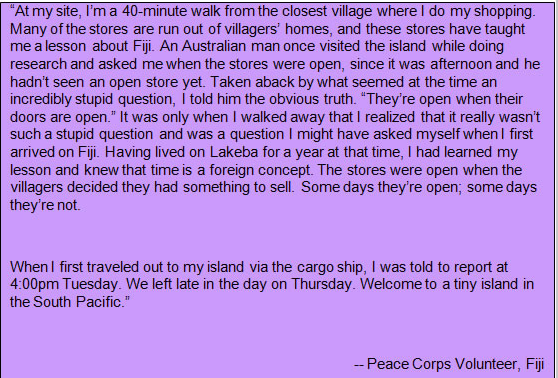
Certificate in Global Health Practice
Module 5: Slower Pace and Elastic Time
One of the first cultural differences volunteers notice about the developing world relates to the notions of time, timing and timeliness. Compared to the Western lifestyle, the pace of life in developing countries is much slower, punctuality is less highly valued, and schedules and appointments are understood to be flexible. The Peace Corps has characterized these two differing concepts of time, which are really two opposite ends of a continuum:
Monochronic time: Time is the given and people are the variable. The needs of people are adjusted to suit the demands of time – schedules, deadlines, etc. Time is quantifiable, and a limited amount of it is available. People do one thing at a time and finish it before starting something else, regardless of circumstances.
Polychronic time: Time is the servant and tool of people. Time is adjusted to suit the needs of people. More time is always available, and you are never too busy. People often have to do several things simultaneously, as required by circumstances. It is not necessary to finish one thing before starting another, nor is it necessary to finish your business with one person before starting with another.(1)
To summarize, in monochronic societies people work around schedules, whereas in polychronic societies, schedules are worked around people. Although the polychronic notion of time may seem new and obscure, it is actually widespread across various cultures and countries. Patience, flexibility, and an open mind are the keys to succeeding as a volunteer in a less monochronic society.
Slow Progress
People may jokingly tell you that you must learn to run on “African Standard Time.” The shift from a monochronic to a more polychronic time scheme can bewilder and frustrate volunteers.
“Americans are notorious for being doers, activists. One of the most common complaints of Peace Corps Volunteers around the world is how long it takes to ‘get things done’ in the host country. Sometimes the complaint appears in comments about the slow pace of life overseas. This American urge to do something, however, is somewhat inconsistent with the Peace Corps mandate to help other people do something.”(2)
With a goal of building local capacity, volunteers are indeed helping other people learn to “do something.” This doesn’t mean that local community members will be working while volunteers laze around. In other words, don’t make the mistake of confusing slower pace of life with easier lifestyle:
“What about the ‘work?’ You’ll notice I put that word in quotation marks, not because you won’t work very hard here. It’s just that you won’t understand why it’s so hard. In the States, hard work is 60 hours a week. Here it’s waiting for things to happen, watching them happen at a pace that’s absurdly slow by the standards you’re used to, and then trying to work the way people work here. Otherwise you won’t be working with them; you’ll be working for them.”(3)–Peace Corps Volunteer, Madagascar
Waiting
In your home country, making others wait is probably considered disrespectful and rude. When you are abroad, however, you can expect to do a lot of waiting. Don’t be insulted if others make you wait; it is not because they are being rude, or because they think you are insignificant. Rather, it is simply a symptom of a culture with a more relaxed attitude towards timeliness and schedules.
Footnotes
(1) “Culture Matters: The Peace Corps Cross-Cultural Workbook,” p. 104. Peace Corps Information and Collection Exchange. www.peacecorps.gov.
(2) “Culture Matters: The Peace Corps Cross-Cultural Workbook,” p. 148.
(3) As quoted in “Culture Matters: The Peace Corps Cross-Cultural Workbook,” p.136.

